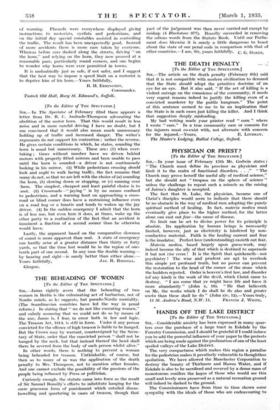THE BEHEADING OF WOMEN
[To the Editor of THE SPECTATOR.]
SIR,—Janus rightly avers that the beheading of two women in Berlin is the culminating act of barbarism, not of Nordic minds, as ha suggests, but pseudo-Nordic mentality. (The Scandinavian countries have led the way in penal- reform.) In stating that " we do not like executing women," and calmly assuming that we could not do so by means of the axe, Janus is, I fear, in error both in law and logic. The Treason Act, 1814, is still in force. Under it any person convicted for the offence of high treason is liable to be hanged. But the Crown may by warrant, countersigned by the Secre- tary of State, order that the convicted person " shall not be hanged by the neck, but that instead thereof the head shall there be severed.from the body of such person whilst alive."
In other words, there is nothing to prevent a woman being beheaded for treason. Unthinkable, of course; but then so to many of us was the application of the death penalty to Mrs. Thompson, not to mention other females. And one cannot exclude the possibility of the passions of the people being inflamed by Press or politician.
Curiously enough, the statute came into force as the result of Sir Samuel Romilly's efforts to substitute hanging for the mere gruesome, form of punishment which' entailed disem- bowelling and quartering in cases of treason, though that
part of the judgement was then never carried out except by mishap (4 Blackstone 377). Romilly succeeded in removing the odious words from the Statute Book. Until our Parlia- ment does likewise it is ,surely a little dangerous to boast about the state of our penal code in comparison with that of other countries.—I am, Sir, yours faithfully, C. G. 0AxFs.


























































 Previous page
Previous page